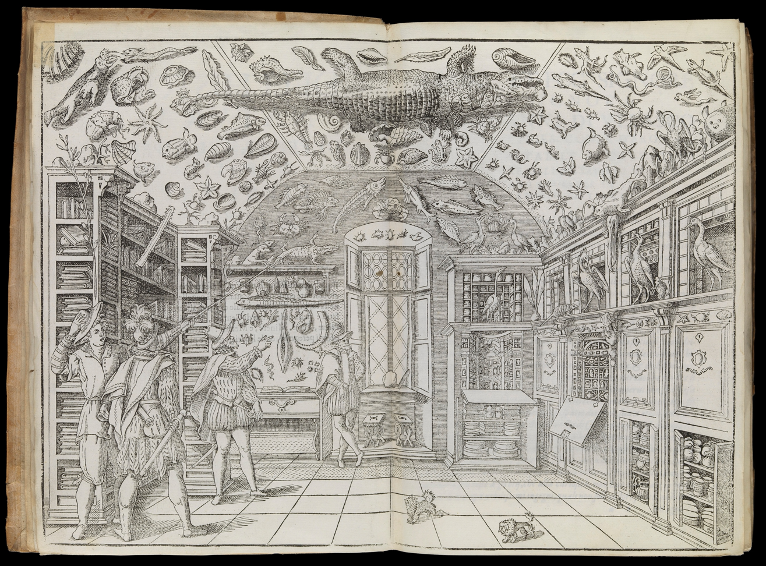Quote
"So saying, he led them up a dark stair, into a small room, decorated with a few paltry figures in plaster of Paris, two or three miserable landscapes, the skins of an otter, seal, and some fishes stuffed; and in one corner stood a glass case, furnished with newts, frogs, lizards, and serpents, preserved in spirits; a human foetus, a calf with two heads, and about two dozen of butterflies pinned upon paper."
Links to the Encyclopedia:
In the midst of this congregation stood a chafing-dish with live coals, for the convenience of lighting their pipes, and every individual was accommodated with a spitting-box. There was not a mouth in the apartment unfurnished with a tube, so that they resembled a congregation of chimeras breathing fire and smoke; and our gentlemen were fain to imitate their example in their own defence. It is not to be supposed that the conversation was either very sprightly or polite; that the whole entertainment was of the Dutch cast—frowzy and phlegmatic; and our adventurer, as he returned to his lodging, tortured with the headache, and disgusted with every circumstance of his treatment, cursed the hour in which the doctor had saddled them with such troublesome companions.
Next morning by eight o'clock, these polite Hollanders returned the visit, and, after breakfast, attended their English friends to the house of a person that possessed a very curious cabinet of curiosities, to which they had secured our company's admission. The owner of this collection was a cheesemonger, who received them in a woollen nightcap, with straps buttoned under his chin. As he understood no language but his own, he told them, by the canal of one of their conductors, that he did not make a practice of showing his curiosities; but understanding that they were Englishmen, and recommended to his friends, he was content to submit them to their perusal. So saying, he led them up a dark stair, into a small room, decorated with a few paltry figures in plaster of Paris, two or three miserable landscapes, the skins of an otter, seal, and some fishes stuffed; and in one corner stood a glass case, furnished with newts, frogs, lizards, and serpents, preserved in spirits; a human foetus, a calf with two heads, and about two dozen of butterflies pinned upon paper.
The virtuoso having exhibited these particulars, eyed the strangers with a look soliciting admiration and applause; and as he could not perceive any symptom of either in their gestures or countenances, withdrew a curtain, and displayed a wainscot chest of drawers, in which, he gave them to understand, was something that would agreeably amuse the imagination. Our travellers, regaled with this notice, imagined that they would be entertained with the sight of some curious medals, or other productions of antiquity; but how were they disappointed, when they saw nothing but a variety of shells, disposed in whimsical figures, in each drawer! After he had detained them full two hours with a tedious commentary upon the shape, size, and colour of each department, he, with a supercilious simper, desired that the English gentlemen would frankly and candidly declare, whether his cabinet, or that of Mynheer Sloane, at London, was the most valuable. When this request was signified in English to the company, the painter instantly exclaimed, “By the Lard! they are not to be named of a day. And as for that matter, I would not give one corner of Saltero's coffee-house at Chelsea for all the trash he hath shown.” Peregrine, unwilling to mortify any person who had done his endeavour to please him, observed, that what he had seen was very curious and entertaining; but that no private collection in Europe was equal to that of Sir Hans Sloane, which, exclusive of presents, had cost an hundred thousand pounds. The two conductors were confounded at this asseveration, which, being communicated to the cheesemonger, he shook his head with a significant grin; and, though he did not choose to express his incredulity in words, gave our hero to understand, that he did not much depend upon his veracity. From the house of this Dutch naturalist, they were draggled all round the city by the painful civility of their attendants, who did not quit them till the evening was well advanced, and then not till after they had promised to be with them before ten o'clock next day, in order to conduct them to a country house, situated in a pleasant village on the other side of the river.
Sources
Tobias Smollett, The Adventures of Peregrine Pickle (London: D. Wilson, 1751), chapter 64. Full text from Gutenberg project.
